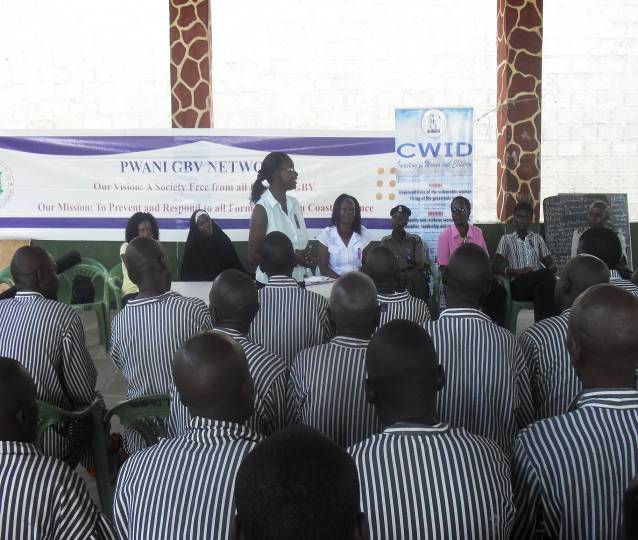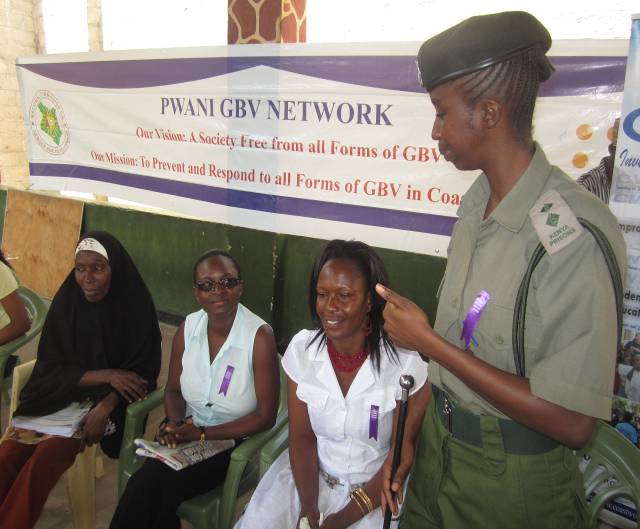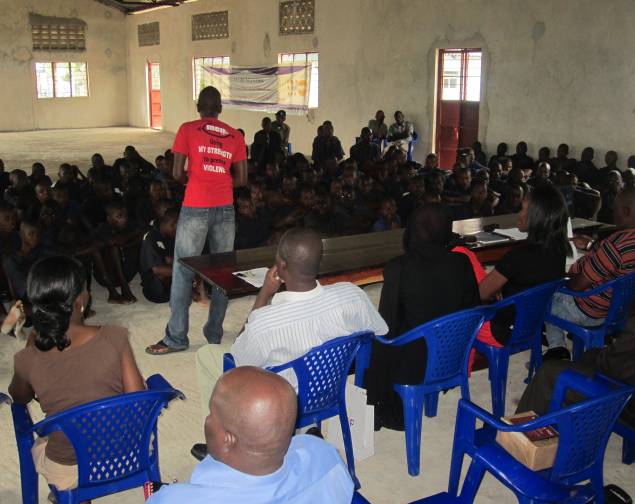BADILIKA PROJECT LAUNCH FOR THE MALE SEXUAL OFFENDERS AT THE PRISONS.
Badilika (Change) is the name of the project that was decided on by the male sexual offenders at Shimo la Tewa Prison, now re-named the Rehabilitation Centre. The group of 19 male sexual offenders who met us on 20th June at Shimo la Tewa Rehabilitation Centre concurred that there is a need to involve the sexual offenders in the fight against gender based violence (GBV), Perpetrators’ behavioral change, participatory learning approaches and involving perpetrators in outreach programs where they can open up and speak openly about how their behavior change has the potential to create more gender-equitable relationships, thereby decreasing gender based violence.
 In
Kenya, after being charged in the court of law and sent to prison,
sexual offenders are forgotten and people don’t keep track of
them once they finish their jail terms, this makes it easy for them
to follow their targets for revenge and go back to their old ways or
even comitt worse crimes. It is also not easy to make contact and
approach these sexual offenders for behavioral change once they are
out of prison.
In
Kenya, after being charged in the court of law and sent to prison,
sexual offenders are forgotten and people don’t keep track of
them once they finish their jail terms, this makes it easy for them
to follow their targets for revenge and go back to their old ways or
even comitt worse crimes. It is also not easy to make contact and
approach these sexual offenders for behavioral change once they are
out of prison.
The
sexual offenders adressed by the Guest Speaker Caroline Teti.
The project aims to work hand in hand with the Shimo La Tewa Rehabilitation Authority and sexual offenders in Shimo La Tewa prison who have accepted their mistakes and are ready to participate in the Badilika program to be human rights ambassadors, challenging other males, young and old, to be 'MEN NOT VIOLENT NOT SILENT'! (Men who are not violent and not silent on issues with GBV)
Introduction
Pwani Gender Based Violence Network (Pwani GBV network) is a group effort of the various organizations addressing issues of gender in general and gender based violence in particular at the Coastal Region in Kenya working in collaboration with the National Commission on Gender and Development.
 The
network which is currently housed by Coast Women in Development
(CWID) was initiated after concerns that the survivors received poor
services from the various service providers
in Coast Province
The
network which is currently housed by Coast Women in Development
(CWID) was initiated after concerns that the survivors received poor
services from the various service providers
in Coast Province
Inspector
Wamboi a lawyer by profession
adressing
the participants at the event
The Pwani GBV
network was started after the realization that there were many
victims of post election violence who suffered both physically and
psychologically due to the abuse inflicted on them.
There was a
need for a body to come up and take responsibility for the prevention
and awareness of gender based violence. This is how the GBV
prevention network was formed and to date the flag for fighting GBV
in the region continues to be raised high.
Background Information.
The Badilika Project is a follow-up from the Engendering Violence Conference in Upsalla University Sweden, where Betty Sharon represented CWID in 2009 and learnt about working with abusive men to challenge violence against women and children. At the same conference a presentation on The Community Walk Against Family Violence by Dr Karen Crinall, Ms Daphne Yarram, Ms Kerry Hamer and Dr Chris Laming was made that presented a model of collaborative research and evaluation of a community awareness project. The report of this freely available at www.coastwomen.org
The Badilika Project is now a joint initiative of Dr Chris Laming, a Lecturer and Researcher at the Monash University Australia and Pwani Gender Based Violence network. The project will mainly focus on the male perpetrators of GBV who have accepted their offenses and are ready to change at Shimo La Tewa Rehabilitation Centre and at the Borstal. This is in order
-
To observe their behavioral change while undergoing correction by law and
-
To find ways of integrating them back to the society and be accepted as a family.
-
To ensure they do not indulge in the crimes again and that vulnerable victims are safe
-
To mentor them be ambassadors of GBV change in their communities.
The Launch at Shimo La Tewa Main Prison on 3rd August 2011.
The event brought together Pwani GBV Network Members, Prison Officers, other Partners and 42 sexual offenders. The official guest speaker was Advocacy Manager Ms Caroline Teti from (DSW) – German Foundation for World Population.
Issues Raised
-
Effects of Sexual Gender Based Violence
-
Reproductive Rights
-
Taking responsibilities on one’s own behaviors
-
Implementation of the project.
-
Signing of Badilika agreement forms
Signing of the Badilika Forms.
This was a little tricky, the members were reluctant in signing the forms since the (camera) media staffs were present, they thought that their signature would be used against them in court, but after assurance that the agreement forms were for the project only, we got signatures from six members whist others confided that they will sign at a later day. More forms were left in the custody of Inspector Wambui.
The project is supposed to be implemented by the Pwani Network members guided by the reference group (the group that accompanied Dr Chris Lamming in the research on Men Not Violent Not Silent)
Badilika Launching at the Borstal Institution on 6th August 2011.
At Borstal there are young offenders, most of the adolescents, this group needs more help in terms of, education , counseling and guidance because they are in the stage when they experience changes in their bodies, they have the need to adventure more and to understand their own selves. In some cases presnted, it was due to lack of knowledge and understanding of the constitution and the sexual offences ACT. Many of the boys were in an affair but it turned out that these girls were under age, but even the law seems to punish only the boy child leaving the girls while in this case it takes two to tangle, this has exposed the boy child to be vulnerable.
The event brought in all the boys of different offences at Borstal Institute, Members of Pwani GBV Network, the National Chairman and members of Men For Gender Equality (MEGEN), staffs from Borstal Institution and a representative from Family Life Connect Counseling centre.
Speakers.
Peter Gichanga - Gender Officer - Family Life Connect Counseling centre
Betty Sharon - Programs Director - Coast Women In Development
Meriline Laini - Paralegal - Pwani GBVnetwork
Millent Okelo - Paralegal Pwani GBV network
John Paul - Programs Officer - Haki Yetu
Dan Osano - Coast Chairperson - MEGEN
Official Guest Speaker
Thuku Wa Njuguna - National Chair Person - MEGEN
Topics discussed.
Masculinity
Counseling
Sexual Offences ACT
Behavioral Change
Adolescence
Talents
Resources from MEGEN.
-
Dare To Speak -12 books
-
Identifying the odds -1 book
-
Wear My Heart -2 CDs
Badilika project activities
In general, the Badilika project aims at carrying ou the following activities;
-
Identification of the Badilika club members in both the adult rehabilitation centre and in the Borstal
-
Breakfast meeting with media to sell the idea for publicity since this is a new initiative in the country and there after involving the media in all the activities of Badilika Project.
-
Adaptation of the Family Safety Tool kits by Dr Chris Laming so that they are culturally relevant.
-
Training sessions with facilitators, prison wardens, network members and Reference Group.
-
Plenary talks with the club members and counseling
-
Preparation of communication materials
-
Community Education, through leaflets, media releases, stories of hope
-
Documentation of the process
-
Initiating a sport club with the Badilika members
-
Meeting with community leaders, village leaders. Badilika members and the family members of the Badilika members
-
Monitoring and Evaluation

David Osano from MEGEN adressing the Borstal boys
Expected Impact
The project will have a wide range of impacts at various levels. The key ones being the following- :
-
Organizations which are working on prevention of GBV will be able to incorporate not only men but also the male offenders who have accepted their offences and ready to change, for the first time in Kenya.
-
Decrease in the number of children who grow in abusive families and become potential abusers, and potential victims.
-
Increased number of abusive men denouncing violence and challenging other men’s violent actions when they witness it.
-
Adaptation of the Family Safety Tool kits by Dr Chris Laming so that they are culturally relevant.
-
Training sessions with facilitators, prison wardens, network members and Reference Group.
-
Plenary talks with the club members and counseling.
-
Preparation of communication materials
-
Community Education, through leaflets, media releases, stories of hope